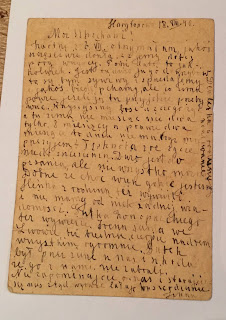My father-in-law Jan Stepek, along with his mother and two sisters spent two years in a Soviet labour camp and as refugees during WW2. Amazingly, despite this, they were able to correspond to family back in Poland. Often these letters were censored or just not delivered, but some still got through. The Red Cross was responsible for delivering letters and parcels, something that still happens in parts of the world to this day which people are unaware of.
After the war, one of the sisters, Danuta, was the first to return to Poland, some 24 years after she had been deported to the camps. There she met her father's two sisters for the first time. After an emotional reunion and conversation one of the aunts left the room and returned with a box. In it was a collection of photographs, documents and some of the letters which had got through to Poland from the labour camps. This was the first time Danuta has seen an image of her parents for over a quarter of a century. Most poignant of all were the letters from her mother, Janina, who had died from starvation in 1942, to her father, who himself had died in Poland in 1943.
One letter begins " Oh my dearest, all of us are still alive, but winter is coming and lasts eight months. Will we still be alive after that?"
These letters are now family heirlooms of probably the most terrible period in their family history. Danuta gave some of the photographs and letters to her sister and her brother, Martin's father. Of course all of these belong to the wider family as a whole and they are still trying to work out how best to archive these precious documents so that everyone can have access to them.


Comments
Post a Comment